#Isolde Roman
Text

Hogwarts MC with the lads. Finally drew Isolde.
#my art#pronounced ee-sol-duh#Isolde Roman#they/them#hogwarts legacy#sebastian sallow#ominis gaunt#slytherin#hogwarts#hogwarts legacy mc#mc x sebastian sallow#nah I just put that there for engagement#traditional art#sketches#pencil sketch#harry potter#sebinis#ominis x sebastian#ominis x oc#ominis x mc
146 notes
·
View notes
Text
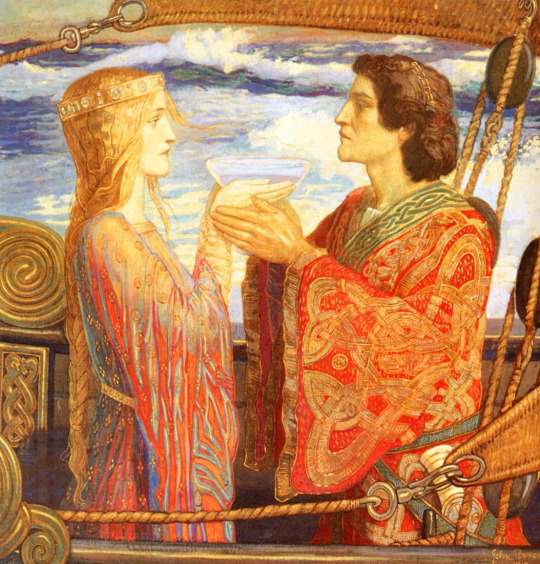
"Tristan an Isolde" (1912), by John Duncan.
#tristan and isolde#john duncan#trem#art#vintage#culture#art history#history#artwork#museums#dark academia#painting#aesthetic painting#dark academia moodboard#dark academia aesthetic#dark academic#dark academia vibes#dark acadamia aesthetic#light academia#myths#legends#cristianity#catholique#roman catholic#catholic#catholiscism#celtics#celtic studies#chaotic academia#fate
105 notes
·
View notes
Note
Hi!! One more thing lol, lately I’ve been interested in the story of Tristan and Isolda and wanted to know about Tristan conjunct mars exact and Isolda conjunct Vesta exact both in synastry. Thx
tw: abuse and suggested suicide.
mars-tristan: positive aspects: mars person may match tristan person's impulsive energy where love is concerned. both are bold and passionate individuals. mars person may tempt tristan person into going against their courtly romantic ideals in favor of intense and passionate expression - sex life is likely really good and addicting for each of these individuals in this relationship. neither person is capable of avoiding their romantic or lustful feelings regarding this relationship. negative aspects: both of these individuals are temperamental in the romantic situation - mars person is quick to stir up conflict/disagreements; they live to spite the tristan person. tristan person is quick to accuse mars person of disloyalty. mars person may be (***TW***) abusive and use sex as a tool for manipulation. tristan person may use disguise or alter their person to make a statement to / get the attention of the mars person (this is the type of relationship where mars person may say "i don't like your hair" and tristan person in turn gets out scissors and starts cutting chunks of their hair yelling "do you like it better now?"). HAHA oddly this dynamic reminders me of debbie and fester's relationship in Addams Family Values. debbie is the mars person and fester is the tristan person. a mars person uses their sexual appeal to tempt and control a tristan person, who is vulnerable and desperate for mars person's love/attention (tristan drank the love potion in the myth). death plays a role here - mars symbolizes sudden death, while tristan symbolizes dying for love; it feels very coercive and pact like... you can't live without one another one moment, the next you are at each others throats (***END OF TW MATERIAL***).
isolda-vesta: positive aspects: isolda person may find themselves in this connection with the vesta person's help. vesta person has a way of enlightening the isolda person where individuality is involved and affirms them that it is okay to be different. vesta person allows isolda person to understand that social norms don't control an individual and that a norm is not a law. both individuals share a sense of dedication. vesta person is someone who does things for isolda person while isolda person is someone who gifts things to vesta person. negative aspects: vesta person is likely doing the bulk of the work and putting forth the most effort in this connection. vesta person has all the power over isolda person in terms of their personality because isolda person seeks identity - isolda person doesn't know how to be an individual without vesta person ironically. vesta person may come to see that isolda person is not dedicated but rather they are obsessed - this may be a huge turn-off romantically for vesta person. vesta person likely intends to not have a sexually relationship (could be asexual or demisexual as well) while the isolda person craves that level of intimacy.
hope this helps!
a.d.
click here for the masterlist
click here for more roman myths & legends
want a personal reading? click here to check out my reading options and prices!
© a-d-nox 2023 all rights reserved
#astrology#astro community#asteroid astrology#astro placements#astro chart#asteroid#natal chart#roman mythology#vesta#asteroid4#isolde#isolda#tristan#synastry
19 notes
·
View notes
Text
ich habe soeben den fehler gemacht an das gottesurteil im tristan zu denken und jetzt muss ich erstens kichern und zweitens darüber nachdenken, dass tristan und isolde nichts heiliger ist als ihre liebe zueinander und dann vergeht mir das kichern ganz fix wieder
0 notes
Text
Paladin Tourney - Preliminary Poll #11 (Legend/older literature)
Roland (various medieval chronicles) vs. D'Artagnan (The Three Musketeers) vs. Lancelot (Arthuriana) vs. Tristan (Tristan and Isolde)
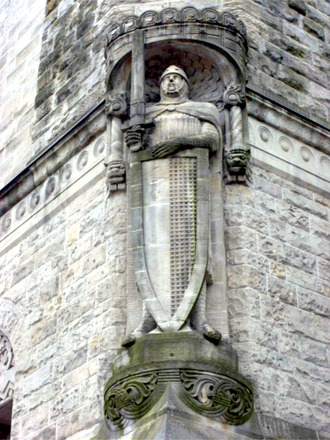
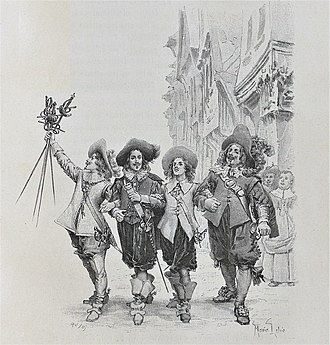
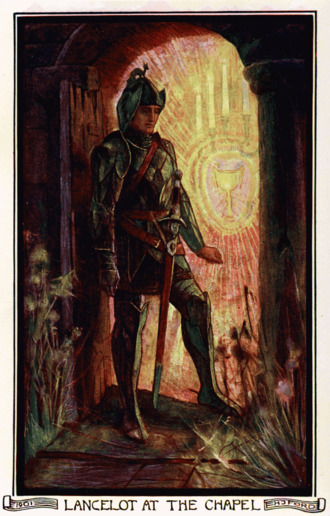
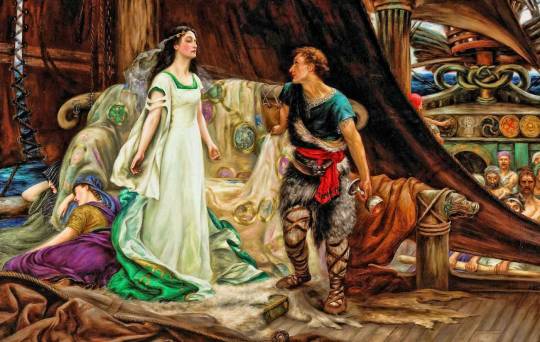
Propaganda:
Roland
The word "paladin" is ultimately derived from a title given to certain retainers of Roman emperors, through titles used for various Carolingian nobles, and finally to the companions of Charlemagne, who are basically the French Knights of the Round Table. Roland, along with Oliver and ten other paladins who vary by storyteller, are where the historical palatinus and the fantasy paladin meet.
D'Artagnan
No propaganda submitted.
Lancelot
No propaganda submitted.
Tristan
No propaganda submitted.
#I know this isn't really a specific fandom but I think they're close enough to go in a preliminary together.#Paladin Tourney#Paladin Tourney Preliminaries#paladin#dnd paladin#d&d paladin#paladins#knights#tumblr polls#tumblr tournament#tumblr tourney#poll bracket#tournament#tumblr bracket#poll tournament#character polls#character tournament#character bracket#roland#d'artagnan#lancelot#tristan#arthurian legend#the three musketeers#tristan and isolde
31 notes
·
View notes
Text
Closed starter: Isolde Stuart and Javier Wagner (@dxncingxnmyown)
Setting: By Javier's chambers, after the poisonings
Checking on a friend, that was what Isolde told herself that she was doing in the wake of the terrible poisonings of the Holy Roman Empire duchies. Of course, she could see right through the flaws in her own logic; Prussia had been unaffected by the poisonings so Javier was perfectly safe, and there was nothing friendly about the twisting she felt inside her when he looked at her. She could feel that pull getting stronger with every step she took though she tried her best to seem calm and collected, the picture of practiced refinement that she had been schooled to be despite the fact that, had anyone looked closely, they would have seen the dusty rose of a blush across her cheeks, though she had not been feeling her best and many might have assumed that the pick was merely fever. It was a fever of sorts, she supposed, for she did not know what else kept her coming back to Javier's door when she knew she could have neither his love nor his hand.
She knocked on the door softly, a gentle rap before stepping back with her hands behind her back, waiting. When he opened the door, she smiled, a truly warm smile at seeing him untouched by pain or illness. "King Javier, I...I came to make sure that you and your family were alright after everything that has happened. One can never be too careful with one's friends after all in such trying times."

21 notes
·
View notes
Note
new here but am wondering what your current WIP is about? if you don't feel comfortable I understand!! love your blog btw <3
Omg thank you so much!!
My main WIP right now is WIPVII (placeholder name until I am forced to actually name it).
It is a lower YA (for 13-15 year olds) low/no magic fantasy (takes place in a different world) with a romance subplot.
It's a (high/late) medieval western European-inspired setting, specifically the year 1333 CE in southern England - I try to be somewhat historically accurate because it makes the setting feel a little fresher than leaning on the medieval European stereotypes common to a lot of fantasy. But alas, there is only so much research I am willing to do (and I did take some liberties because, dammit I wanted a masquerade ball).
The WIP draws inspiration from Shakespeare comedies (Cymbeline, Twelfth Night, The Tempest etc), Alfred Tennyson poems (in particular "The Splendour Falls"), the Robin Hood myth, and fairy tales and medieval epics in general.
[More below the cut]
The blurb:
Two kingdoms long at war have laid down their arms at last, but peace hinges on treaty that can only be sealed by the marriage of the eldest son of the King of Dian to the eldest daughter of the King of Cithidy. But Isolda de Angenet, the princess of Cithidy, has gone missing and she does not want to be found.
In disguise as a peasant boy, Isolde (known as Aldus) accidentally falls in with a ragtag group of bandits - and Henry, a knight with a mysterious past - who have been sent to find the missing princess and deliver her to the outlaw lord Hob. But there is some larger scheme afoot here.
Once more, a Cithian army marches reluctantly toward Dian and Isolde fears the only way to stop it is to return to her old life and join the husband she has never met in Dian. Isolde has forsworn this marriage but unless she can find another way, she fears she will have to choose between her own freedom and peace.
In the meantime, Henry is hiding something and Isolde will find out the truth, hopefully before Henry finds out who she really is.
Some other things about this WIP:
The name: WIPVII is just WIP + the roman numeral for 7 (VII). I refuse to properly name this WIP until I am forced to, so WIPVII is a placeholder name. I have a lot of WIPs so I number them from oldest to newest to keep track of them (this has nothing to do with the order I choose to work on them). This also means, when a WIP doesn't have a name yet, I have a convenient placeholder name ready to go! WIPVII is 7 because it is the 7th WIP I thought up.
Status: I am currently 60% of the way through my 3rd draft.
Word count: draft 2 was 77k and I am expecting draft 3 to be similar (around 82k because I added some description and worldbuilding and the prose is more flowery). I am aiming for 80k, give or take 5k.
WIPVII is meant to be a standalone.
--
The was inspired by the premise:
A princess runs away from an arranged marriage and ends up falling in love with the person she was supposed to marry (neither of them know who the other really is).
-- this is technically a spoiler, but they way the story is written I think most readers will guess the twist looong before it comes. And honestly, I think the story is a lot more fun if you figure it out well in advance. I am a sucker for dramatic irony.
4 notes
·
View notes
Text
THIS DAY IN GAY HISTORY
based on: The White Crane Institute's 'Gay Wisdom', Gay Birthdays, Gay For Today, Famous GLBT, glbt-Gay Encylopedia, Today in Gay History, Wikipedia, and more

44 BC – Italy: The first written reference to same-sex marriage appears when Cicero insults promiscuous Mark Antony whose father Curio "established you in a fixed and stable marriage, as if he had given you a stola." A stola is a traditional garment worn by married Roman women. Cicero’s sexual implications are clear, the point of which is to cast Antony in the submissive role in the relationship and to impugn his manhood.

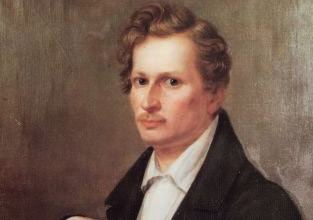
1796 – The poems of Count August von Platen (d.1835) are homoerotic expressions of Platonic love, idealism, beauty, friendship, and longing. Platen was born in Ansbach, Bavaria, the son of an impoverished nobleman. He attended the Military Academy at Munich and the Royal Institute of Pages resulting in his commission as a lieutenant in 1815 in a regiment against France during the time of Napoleon; he, however, engaged in no action.
Platen was extremely erudite, mastering a dozen languages, including literary Greek and Latin, French for social status, Persian for poetic reasons, and even English.
An admirer of Michelangelo and Italian art, Platen visited Florence, Rome, Naples, Syracuse, and Sicily. While in Naples in the 1820s, he formed a homosexual friendship with the poet and painter August Kopisch, all the while perfecting the content and form of his poetry. By 1826, he had moved permanently to Italy, supported by a pension from his friend, King Ludwig I of Bavaria.
Focusing his sexual urges into the artistic and creative realms, Platen transformed his passion for same-sex relations from the physical to the intellectual. On occasion, a friendship lasted only a year or so—for example, his intense relationship with a young painter, Rühl—but it nevertheless served to heighten his creative powers.
His controversial, multilingual, autobiographical narrative, which contains an explicitly erotic homosexual theme, was not published until the end of the nineteenth century, under the title Diary (Die Tagebücher, 1896-1900). In his poetry, Platen employs a recurrent homoerotic image borrowed from Persian poetry, the tulip, which is a spiritual symbol for masculine love.
Platen's longing for love and friendship is a persistent motif in his work. He addressed seven sonnets to "Cardenio," an Erlangen student, who is described as a young, tall, dark, and handsome man with full lips. Platen addressed an additional twenty-one sonnets to another Erlangen student, "Karl Theodor German." Embodying themes of Platonic love, friendship, longing, idealism, and beauty, Platen's sonnets express unrequited love for men.
Platen's homosexuality is the subject of a vicious attack by Heinrich Heine in The Baths of Lucca. Edward Carpenter, however, expressed his appreciation for Platen in his Ioälus, An Anthology of Friendship (1902). Among German writers who admired Platen is Thomas Mann, who praised him in a lecture in 1930; Platen's poem "Tristan" (1825) inspired Mann's novella Tristan and Isolde (1903).


1820 – Seventeen year old Ralph Waldo Emerson wrote of his crush on fifteen-year old Martin Gay: I begin to believe in the Indian doctrine of eye fascination. The cold blue eyes of (blank) has so intimately connected him in my thoughts & visions that a dozen times a day & as often by night I find myself wholly wrapped up in conjectures of his character and inclinations. We have already two or three long profound stares at each other. Be it wise or weak or superstitious I must know him.


1960 – Bradley Darryl BD Wong is an American actor, best-known for his roles as Dr. George Huang on Law & Order: Special Victims Unit, as Father Ray Mukada on HBO's Oz, Henry Wu in the movie Jurassic Park, and for his starring role as Song Liling in the Broadway production of M. Butterfly.
Wong gained attention for his Broadway debut in M. Butterfly opposite John Lithgow. The play won multiple awards, including several for Wong. He is notable as the only actor to be honored with the Tony Award, Drama Desk Award, Outer Critics Circle Award, Clarence Derwent Award, and Theatre World Award for the same role.
In 2008, he starred in the one-man show Herringbone, in which he portrays 11 roles, at the McCarter Theatre at Princeton University.
Wong, who is openly gay, began a long-term relationship with talent agent Richie Jackson in 1988. In 2000, Wong had twin sons: Boaz Dov, who died 90 minutes after birth, and Jackson Foo Wong. They were born through a surrogate mother, using Wong's sperm and an egg donated by Jackson's sister. In 2003, Wong wrote a memoir about his experiences with surrogacy titled Following Foo: the Electronic Adventures of the Chestnut Man. Wong and Jackson ended their relationship in 2004.
Wong very strongly identifies as a gay man. Hence, he has been a visible presence at AIDS-related charity functions and in gay and lesbian community events, as well as at events sponsored by the Asian Pacific Islander communities. Wong has appeared at the GLAAD Awards, made promotional spots for the gay and lesbian television newsmagazine In the Life, and worked in various ways to further understanding among both Asians and non-Asians, gays and non-gays, about the experience of being both gay and Asian.


1964 – Dan Mathews is the Senior Vice President of People for the Ethical Treatment of Animals. He is known for heading PETA's most controversial and attention-getting campaigns, including the "I'd Rather Go Naked Than Wear Fur" ads, as well as campaigns involving celebrities such as Morrissey, Pamela Anderson, Pink, and Paul McCartney.
He started poor, was bullied in high school, worked at McDonalds and as a model to put himself through American University, and after graduating started at PETA as a receptionist.
In 2000, he was named by gay lifestyle magazine Genre as one of the most influential people of the new century. When asked by the magazine whom he considered an influential gay person, he replied, spree killer "Andrew Cunanan, because he got Gianni Versace to stop using fur." In 2007, Mathews was ranked 37th in Out magazine's "50 Most Powerful Gay Men and Women in America".
Mathews has written a memoir, Committed: A Rabble-Rouser's Memoir, which he characterized as "an adventure story. It's like 007 wearing freaky outfits". The book tells the story of how he became a public person, the various exploits he's undertaken for PETA, and different campaigns he has done.

In May 2009 he commented on the actions of the governor general of Canada who, in participating in an Inuit tradition, consumed a raw seal heart. He is quoted as saying to the Toronto Star, "It amazes us that a Canadian official would indulge in such bloodlust. It sounds like she's trying to give Canadians an even more Neanderthal image around the world than they already have." Although Mathews admits to being attracted by extremes, he states that he and PETA engage exclusively in legal activities, but they do not necessarily condemn the actions of animal rights extremists.

1912 – The Arizona Supreme Court rules that fellatio is not outlawed by the term "crime against nature."

1981 – The first National Conference on Lesbian and Gay Aging was held in California, sponsored by the National Association for Gay and Lesbian Gerontology. It sought to "dispel myths about older lesbians and gay men, advance research, establish programs and services for lesbian and gay elders, and encourage and provide support for lesbian and gay gerontologists."


8 notes
·
View notes
Note
hi. could you recommend medieval literature? thank you :)
uuh, yes i can but that really depends on the fact if you can understand german! i dont know if there are english translations of it (i read them in dual language editions, with middle high german and new high german) - i only have read one book that is not german
But in case you can, here are the ones i read in the past year (the not german one is the last one):
Collection of poems by Walther von der Vogelweide - one of the most famous german speaking minnesänger, lived from 1170 - 1230, and has stolen my heart with his diss tracks to the pope; author of the Famous 'Palästinalied' written as propaganda during the crusades
Collection of poems by Neidhart von Reuental - another important german speaking minnesänger, born around 1180/90, so a younger contemporary of Walther, sings a lot about the 'stupid peasants' and how they try to emulate life of the nobles (great fun, the peasants hated him); the Neidhart persona was very self depricating, depticting an unlucky knight; my favourite song of his is 'Meie din liechter schin'
Der Ackermann by Johannes von Tepl - probably one of my absolute favourite books ever, written in the early 15th century as a story for a friend of Johannes von Tepl, who himself was an educated man from northern bohemia; technically already early new high german and not middle high german; the story is a dialogue between a man and death - the mans wife has just died and he starts insulting death, demanding to bring her back. it goes back and forth, and they discuss life, death, humanity creation, god and grief. i loved it
Ein kurtzweilig Lesen von Dil Ulenspiegel - written around 1515 by an anonymous author in early new low german; german speaking people are more familiar with the modern name Til Eulenspiegel. I grew up with the modern adaptations of the story, but the late medieval ones are so, so much more crude. it is a collection of short stories, telling the tale of Dil Ulenspiegel, a silly boy/young man who does silly things. a medieval comedy, nothing profound. the original print has nice wood cut illustrations. it was widely popular, because medieval people could read (although they couldn't necessarily write)
Parzival by Wolfram von Eschenbach - written around 1200-1210 in southern germany, picks up athurian legend. i am half way through and have personal beef with wolfram. but it is good, a lot of depictions of noble life and medieval morals and ideas. makes A LOT of references to other writers of the time, including Walther von der Vogelweide, Gottfried von Straßburg (see next book) and Hartmann von Aue (see below)
Tristan by Gottfriend von Straßburg - written around 1210, is the german adaptation of the tale of Tristan and Isolde. I have not read it yet, but the books are on my shelf to be read as soon as I am done with Parzival
Erec by Hartmann von Aue - written around 1180/90 is said to be the first arthurian story written in german and an adaptation of the old french Erec et Enide - same as above have not read it yet
Iwein by Hartmann von Aue - second arthurian story, written around 1200, also adaptation of the old french story - same as above i have to still read it
The tale of the two lovers by Aeneas Sylvius Piccolomini (future Pope Pius II) - written in latin (there are english translations!) in the mid 15th century for a friend while at the court of Vienna, this is the most famous medieval erotic novel we have! It is about a married woman falling in love with one of the holy roman emperors men while they visit the town in italy she lives in, and the spicy affair they end up having, probably based on a similar story that happened. Aeneas lived a wild life and was old beyond his age, having 2 kids with two different women in two different countries out of wedlock and being a well travelled poet. he also hated women, like, A LOT. after he became pope he wanted to supress the circulation of the book, but is was a best-seller so it didnt work evidently, as i have read it in the 21st century
In addition to that, as a historical fencer I also read the sources, but these will be boring to people who dont care, but here are some anyways:
The Art of Swordsmanship by Hans Lecküchner - most famous source for Langes Messer techniques
Das Fechtbuch by Albrecht Dürer - yes, THE Dürer wrote a fencing book, completely in verse with nice illustrations!
Jude Lew - his fencing manuals are also nice, no illustrations only text
Hope this helps in a way.. again, i read mostly german medieval literature, so idk if this is useful as idk if any of these books have been translated
#personal#medieval literature#middle high german#medieval studies#any real medievalists could add something that is more useful#i am just a hobbyist reenactor
11 notes
·
View notes
Text
Tag Nine People You'd Like to Get to Know Better!
I was tagged by @musesofhororr
𝐅𝐀𝐕𝐎𝐑𝐈𝐓𝐄 𝐂𝐎𝐋𝐎𝐑(𝐒): Green, Purple, Blue
𝐅𝐀𝐕𝐎𝐑𝐈𝐓𝐄 𝐅𝐋𝐀𝐕𝐎𝐑(𝐒): generally something savoury, sour, do have a soft spot for sweet flavours like cotton candy
𝐅𝐀𝐕𝐎𝐑𝐈𝐓𝐄 𝐌𝐔𝐒𝐈𝐂: Hozier, Mitski, The Civil Wars, Classical music, Mäneskin, Depeche Mode, David Bowie, Queen, Tamino, The Neighbourhood, Muse
𝐋𝐀𝐒𝐓 𝐒𝐎𝐍𝐆: Francesca by Hozier
𝐅𝐀𝐕𝐎𝐑𝐈𝐓𝐄 𝐌𝐎𝐕𝐈𝐄(𝐒): Crimson Peak, Casablanca, The Philadelphia story, Roman Holiday, Thor: The Dark World, Thor, Pride and Prejudice (2005), Shakespeare in love, Tristan & Isolde, Ever After, Memento, Elizabeth: The Golden Age, Troy (2004), Prince of Egypt
𝐋𝐀𝐒𝐓 𝐌𝐎𝐕𝐈𝐄: Bridget Jone's Diary (2001)
𝐅𝐀𝐕𝐎𝐑𝐈𝐓𝐄 𝐒𝐄𝐑𝐈𝐄𝐒: Secret Bridesmaids business (K*tie McGr*th plays a bisexual lawyer in it; need I say more), The Last Kingdom, BBC Merlin, This is Us, The Killing, X-Files, The Fall, Sons of Anarchy, i Medici (Masters of Florence), The Borgias
𝐋𝐀𝐒𝐓 𝐒𝐄𝐑𝐈𝐄𝐒: If we go with what I finished then The Fall otherwise last watched Monarch on Apple TV+
𝐂𝐔𝐑𝐑𝐄𝐍𝐓𝐋𝐘 𝐖𝐀𝐓𝐂𝐇𝐈𝐍𝐆: X-files (on s2 rn, love it so far), The Morning Show, The lions of Sicily, Vikings, Criminal Minds
𝐂𝐔𝐑𝐑𝐄𝐍𝐓𝐋𝐘 𝐑𝐄𝐀𝐃𝐈𝐍𝐆: Jane Austen: Northanger Abbey
𝐂𝐔𝐑𝐑𝐄𝐍𝐓𝐋𝐘 𝐖𝐎𝐑𝐊𝐈𝐍𝐆 𝐎𝐍: The second chapter of a 2 part fanfiction, the 6th chapter of a multi-chapter fic and a one-shot
Tagging (only do this if you'd like to + whoever sees this on my blog and wants to do it): @justanothermultimuse @esoterium
4 notes
·
View notes
Text
My yandare af Slytherin MC, Isolde Roman.
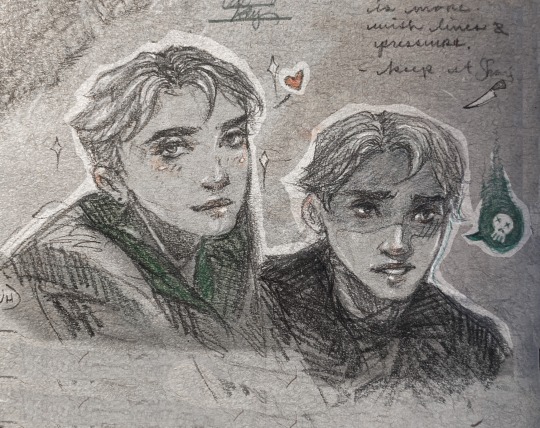
They have my pottermore sorting🐍, wand, (Cypress, Phoenix Fether, 12.5” & unrelenting) & Patronus, lion with a huge mane. Pure blood, dead parents, and has a rich aunt that sends them funds. Throwing Isolde into this game was totally cathartic and so much fun. So because no one asked…heres all their facts.
Very classic tropes of a Dark Arts Kid™. They were my first oc for the WW back in 2010-2011 and they’ve grown up with me as my horrible other half. Isolde is always spending their time acting as a teachers pet, stalking Poppy, (she’s so pure and must be corrupted,) enabling Sebastian’s dark side, and constantly fantasizing about convincing Ominis to murder his family and take their estate. (Just a silly lil murder, gosh.)
Isolde favors curses and fire spells, and they simply love Occlumency. Any mind game is their favorite thrill. (They think imperio is kinky.)
They’re terribly sweet to people, but it’s all a face. Anything they want they get, take, or steal without a second thought. Selfish, cunning, pretty, cruel, quiet, curious, the kind to watch with a worried expression as you scream from their curse, stroke your face, smile sweetly, then cast it again. Isolde is really just the worst.
They follow Poppy around to make sure no one bullies her, but really they’re horribly possessive and just want her all to themselves, scaring off anyone trying to flirt with her. Those two boys that harassed her behind the beasts hut found themselves in hospital.
Isolde and Sebastian bring out the worst and each other and love it. Ominis does his best, but he’s wrangling two dumb dogs who won’t shut up or behave whenever they go out.
Teenagers scare the living shit out of me. 7th year, shits already gone down.
Involves: misuse of unforgivables, dark!MCxPoppy, MCxSebxOmi, dark!Ominis. corruption, sadism, smut, angst, elements of cannibalism (I’m sorry.) & blood. V dark stuff but it’s all so much fun.
#my art#it’s not like cannibalism cannibalism but just a little?#like dark sacrifice stuff#not hannibal related#just a little cannibalism Stan. tell mom it’s okay.#hogwarts legacy mc#hogwarts legacy#sebastian sallow#harry potter#ominis gaunt#slytherin#ao3#hogwarts#sebastian x ominis#poppy sweeting#poppy#mc#oc#wizarding world#ancient magic#my oc character#oc story
9 notes
·
View notes
Text
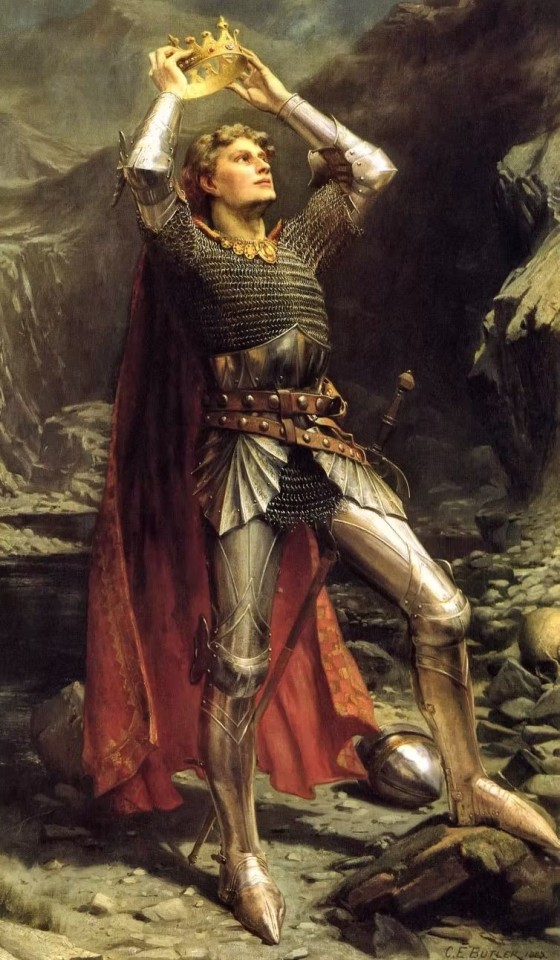
King Arthur
Charles Ernest Butler, 1903.
The historical sources
The name Arthur first appears in the work of the 9th century Welsh historian Nennius, who lists twelve battles this Arthur fought against invading Saxons. Similarly, the Welsh Chronicles (written down in the 10th century) make some references to battles fought by Arthur. On this shaky foundation, along with a scattering of place-names and oblique references, is an entire legend based.
Ask any scholar of Arthurian literature if King Arthur really existed, and we’ll tell you: we don’t know, and we don’t really care. The good stuff, the King Arthur we all know and love, is entirely fictional.
The “Arthurian Legend” really kicked off in the early 12th century, with Geoffrey of Monmouth’s History of the Kings of Britain (1138), which purported to describe the entire history of Britain from the day dot until about the 7th century.
He describes the founding of Britain by the (mythical) Trojan warrior Brutus; he covers a lot of the historical events described in Nennius’ earlier work; and his account is the first to really describe King Arthur’s reign, his wars against the Saxons, and the doings of the wizard Merlin. Some elements, like the part where Merlin helps Arthur’s father Uther deceive and sleep with another man’s wife, thus conceiving Arthur, remain key parts of the Arthurian legend today. Other elements modern audiences expect, like the Round Table, are still absent.
Geoffrey of Monmouth wrote in Latin, and his book was read and treated as a history book in the Middle Ages. But very quickly, the material was re-worked into French and English poetry. The Norman poet Wace, whose audience included people living in both France and England, based his Roman de Brut (1155) on Geoffrey’s History. He added many things to the story, including the Round Table itself.
Around the turn of the thirteenth century, an English poet named Layamon took both Geoffrey and Wace’s works, combined them, and added more in his long English poem Brut. Arthur is not the only subject covered in the Brut, but it’s the first treatment of King Arthur in English.
These versions, and some of the later English romances like Of Arthur and of Merlin, focus on battles and political tensions. Aside from Merlin they feature few supernatural elements, and do not usually devote much attention to love. In these versions, the traitor Mordred who defeats Arthur at the battle of Camlann is usually his nephew, not his illegitimate son; and Guinevere may willingly marry him after Arthur’s death.
The Romances
Arthurian romance is where things really start getting fun, from the 12th century onwards. The earliest romances did not focus on Arthur himself, but on various heroes and knights associated with his court.
The very first might be the Welsh Culhwch and Olwen, the events of which rarely make an appearance in later Arthurian works, but which share with them a common basic plot structure: a young man needs to prove himself to win the hand of a fair lady, goes to Arthur’s court, undergoes a series of supernatural adventures, and is eventually able to marry his lady and settle down.
The earliest surviving French Arthurian romances are by an author named Chrétien de Troyes. He wrote five romances, of which the most fun, in my humble opinion, is The Knight of the Lion (1176). The most famous is The Knight of the Cart (1180), which introduces Lancelot and his love affair with Queen Guinevere.
Hot on its heels came The Story of the Grail (1181), which introduces Perceval and the Grail quest – although Chrétien himself never finished that work. At around about the same time, a separate tradition of romances about the knight Tristan and his affair with Queen Isolde of Cornwall was also circulating.
Over the 13th to 15th centuries countless romances were written in French and in various other European languages, telling tales of the adventures of individual knights associated with King Arthur.
For instance, in the 14th century English poem Sir Gawain and the Green Knight (1390), a young Gawain is challenged to cut off the head of the Green Knight, in return for which the Green Knight will cut off Gawain’s head a year later. Unfortunately for Gawain, the green knight has supernatural headless-survival powers which Gawain lacks, and so the adventure unfolds as Gawain seeks to keep his bargain and his head.
After Chrétien de Troyes’ day, the Grail quest story became extremely popular: there are several continuations of his unfinished poem, a complete reworking in German by a Wolfram von Eschenbach, and many translations. In these, Perceval is the hero who becomes keeper of the Grail. In the complex French prose version known as The Quest of the Holy Grail (1230), Lancelot’s illegitimate but extraordinarily holy son Galahad takes that honour.
The death of Arthur
If you read no other piece of medieval Arthuriana, read the 13th century French prose romance The Death of King Arthur (1237). The Penguin translation by James Cable is eminently readable, and cheap too. This romance circulated in the middle ages as the last of a “series” of Arthurian works beginning with the Grail’s arrival in Britain and ending with the break-up of the Arthurian court and Arthur’s own death. We call this whole series the Vulgate Cycle, or the Lancelot-Grail Cycle.
This series, rather like many modern fantasy series, was written out of order: the long romance known as the Lancelot Proper and the Quest of the Holy Grail (the one with Galahad, mentioned above) were composed first, by different authors; very quickly afterwards the Death of King Arthur was added, and then the prequel material dealing with the origin of the Grail and the birth of Merlin was added.
In the Death of King Arthur, the Arthurian court is aging. Lancelot has lost his chance at the Grail, the court’s harmony is shattered as Guinevere’s adultery comes to light, Mordred betrays Arthur, and everything falls to pieces.
Fast forward to the 15th century, and an English knight named Thomas Malory, serving time in prison in Calais for attempting to abduct a young heiress, gets hold of the Vulgate Cycle, the Tristan romances, and a range of other material, and produces the most famous piece of English-language (despite its French title) Arthuriana: Le Morte d’Arthur. Malory, whatever else he might have been, was a completist, and he tried very hard to make a single coherent story out of the many contradictory he sources he had.
Chances are, if someone in an English-speaking country says to you they’ve read the “original” story of King Arthur, it’s Malory they mean. Its great popularity is explained by the fact that William Caxton put out a printed edition in the late fifteenth century. You can find that for free online, but the best reading version is the Oxford World’s Classics translation by Helen Cooper.
Text: https://theconversation.com/guide-to-the-classics-the-arthurian-legend-64289
46 notes
·
View notes
Text
In Straßburg‘s Tristan there are a references to greek/roman mythology. It’s shown that Tristan has knowledge and is fond of tales from old mythology, as he exchanges stories with Isolde. FGO displayed this knowledge and side of Tristan perfectly in Meiho-Sou and Enma-Tei.
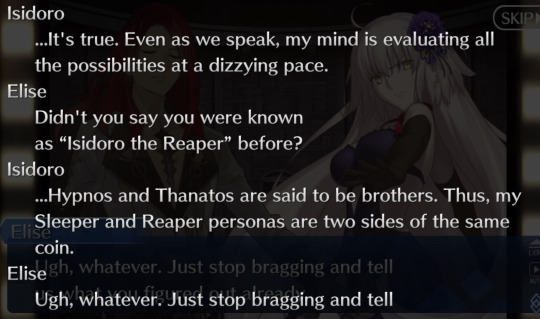
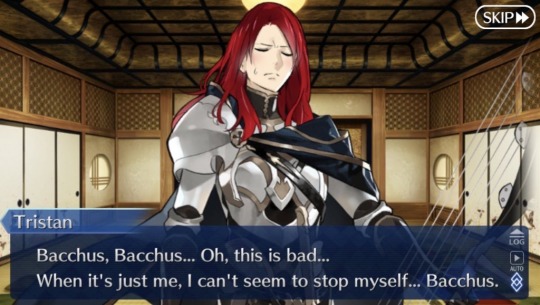
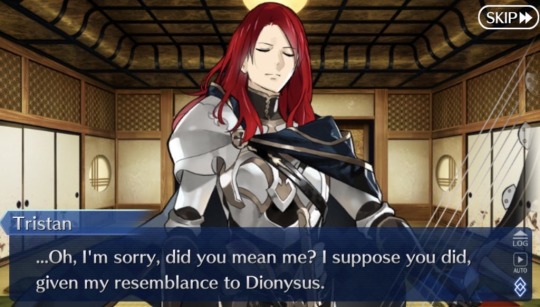

#fate grand order#fgo#fate go#tristan#fate go tristan#fate grand order tristan#fgo tristan#tristan fate go#tristan fate grand order#tristan fgo#tristan and isolde#tristan and iseult#gottfried von straßburg#gottfried von straßburg tristan#Analysing Tristan with Juquia#Tristan Facts with Juquia#Fun Tristan Facts with Juquia
14 notes
·
View notes
Text
Dante without a Virgil — The Good Fight 6x01
just before the finale episode of The Good Fight dropped, i made a twitter thread with my unsolicited thoughts on Dante without a Virgil, referenced in ep 6x01. i then followed up after the finale and since it's missing Diane hours, i'm reposting both threads here.
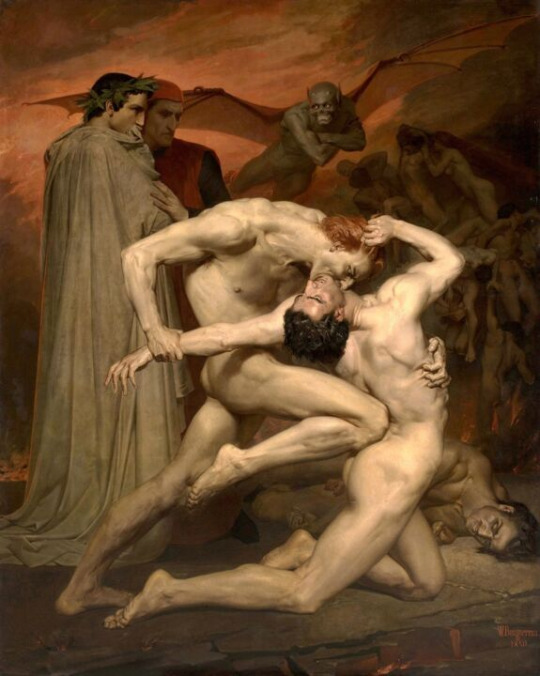
William Bouguereau, Dante and Virgil, 1850, oil on canvas, Musée d'Orsay, Paris
so. Dante Alighieri wrote the Divine Comedy in 13C. he plays himself in the story, and being guilty of the sin of lust (Diane Lockhart you WENCH), ends up in hell. there he meets the soul of Virgil, an actual poet during the time of the Roman Republic. hence, Dante met Virgil in hell.

Virgil offers to help Dante through the nine circles of hell to get to paradise. *hallelujah*

but wait. the gates of hell bear the ominous inscription 'All hope abandon, ye who enter in!' and guess who talks about hope this season? Diane Lockhart.
Dante and Virgil are really student and teacher (so if you project, then the relationship is also uNetHiCaL). but Virgil also *protects* Dante. hmmm.

lust is the second circle, and this is where hell really begins. i think the interesting circle is the eighth, violence. against neighbours, self, and God/nature. it is VERY evident from Virgil that the violence of man destroys nature itself.


Virgil has a grander understanding of divine will, which he tries to teach Dante. hello buddhism. whether it works... well, Diane is holding a dorje in the finale teasers. but also:

s6 has really been about legacy, what this is all for (children 😥), tho it circles back to 101 (how is my life so fking meaningless?). as author, Dante knows Virgil has a legacy, but Dante is also concerned about his own legacy.

do i think Diane is perhaps imagining her version of hell while she's on PT108? maybe... remember her first session with the doctor she dreamt of a picnic with a guy (which i think is realised in the finale) and said:

Eugène Delacroix's The Barque of Dante depicts Virgil helping Dante cross the River Styx, which is in the fifth circle, anger.
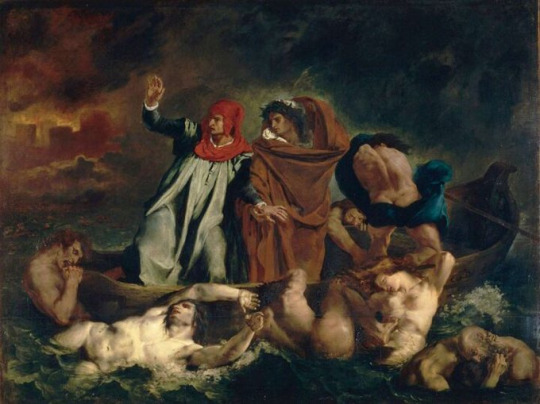
Eugène Delacroix's The Barque of Dante (1822, oil on canvas, Musée de Louvre, Paris)
Post-finale addendum
so how does Dante end? Dante goes through 9 spheres of heaven & enters the Empyrean, the place of pure light where God resides, which feels like a dream to him (cf surrealism/reality).

Gustave Doré's Paradiso Canto 31, 19C engravings for the 1861 edition of The Divine Comedy
Dante's journey began with him losing faith, questioning "why", as Diane has since s1: "In the middle of the journey of our life, I came to myself in a dark wood, for the straight way was lost."

btw Kurt did actually understand Tristan und Isolde, even if he couldn't verbalise it.

he quit his job and ran up those flights of stairs to ~save her~. that's the drama of Tristan & Isolde.

so by the end, Dante has found that his search for completeness is a journey. and Diane has realised that love is at the centre of her universe 💛
#dante and virgil#the good fight#the good wife#diane lockhart#christine baranski#robert and michelle king#gifs#*mine#nat's tangents#the good universe#nat's art history threads#the art of referencing art in art
16 notes
·
View notes
Text
Closed starter: Isolde Stuart and Evelyn Stuart (@bloodycrxwn)
Light brushed against Isolde's eyelids, the sun alerting her to the fact that another day had dawned...but it had already dawned. Isolde's thoughts, her memories filtered in slowly as woke. She had been awake for sunrise, had made it back from her nightly walk after being unable to sleep. She had sat down in the chair after some tea with the hope of gardening after relaxing her muscles and then...blackness. She opened her eyes and found her sister walking in. At the sight of Evelyn, she sat up straight and fussed at her hair, twisting it behind her and smiling, hiding the tiredness and aching of her limbs.
"Evelyn, how are you? I was just on my way out to the garden, if you wanted to join me for some air."
She hoped she seemed breezy, not like she had just passed out from exhaustion in the morning. Evelyn was perceptive, but hopefully she had more on her mind with the escape of the rulers of the Holy Roman Empire.

7 notes
·
View notes
Text
So protects them the night, and the friendly shadow of the great pine.
“Tristan,” says the queen, “Do the seafarers not swear that this castle of Tintagel is enchanted, and that by this enchantment, twice a year, in winter and in summer, it is lost and disappears from sight? For it is lost now. Is this not the marvelous orchard of which the harp lays speak: a wall of air encloses it on all sides; there are flowering trees and fragrant soil; there lives the hero, never-aging in the arms of his friend, behind that very wall of air that no enemy can breach?"
Already on the towers of Tintagel the lookouts ring out their horns to announce the dawn.
“No,” says Tristan, “our wall of air has already been breached, and this is not that marvelous orchard. But one day, friend, we will go together to the Fortunate Land from which no one returns. There stands a castle of white marble; in each of its thousand windows gleams a lighted candle; in each, a bard plays and sings an endless melody; the sun does not shine there, and yet no one misses its light: it is the happy land of the living."
But atop the towers of Tintagel, dawn shines on the great alternating blocks of azure and green.
Chapter 6, The Great Pine
"Friend, close your arms tightly around me so that, in this embrace, our two hearts break and our souls depart! Take me to the fortunate country you once spoke of: to the country from which no one returns, where illustrious musicians sing endless songs. Take me!"
"Yes, I will take you to the fortunate land of the Living. The time is approaching; have we not already drunk all misery and all joy? The time is approaching; when all is accomplished, if I call you, Isolde, will you come?"
Chapter 18, Folie Tristan
— Joseph Bédier, Le Roman de Tristan et Iseult (1922)
(My free translation — somehow these passages were omitted from Hilaire Belloc's English translation)
These are some of my favorite passages of the Bédier version, and I can't find anything like this in either Béroul or Gottfried, so I wonder where it comes from... I love the image of the disappearing castle, but I especially love the ambiguity on whether they're talking about the after-life (which Tristan calls the Land of the Living) or about Avallon — both? They feel like one and the same, here...
Original French below:
Alors la nuit les protège et l'ombre amie du grand pin.
« Tristan, dit la reine, les gens de mer n'assurent-ils pas que ce château de Tintagel est enchanté et que, par sortilège, deux fois l'an, en hiver et en été, il se perd et disparaît aux yeux ? Il s'est perdu maintenant. N'est-ce pas ici le verger merveilleux dont parlent les lais de harpe : une muraille d'air l'enclôt de toutes parts ; des arbres fleuris, un sol embaumé ; le héros y vit sans vieillir entre les bras de son amie et nulle force ennemie ne peut briser la muraille d'air ? »
Déjà, sur les tours de Tintagel, retentissent les trompes des guetteurs qui annoncent l'aube.
« Non, dit Tristan, la muraille d'air est déjà brisée, et ce n'est pas ici le verger merveilleux. Mais, un jour, amie, nous irons ensemble au Pays Fortuné dont nul ne retourne. Là s'élève un château de marbre blanc ; à chacune de ses mille fenêtres brille un cierge allumé ; à chacune, un jongleur joue et chante une mélodie sans fin ; le soleil n'y brille pas, et pourtant nul ne regrette sa lumière : c'est l'heureux pays des vivants. »
Mais, au sommet des tours de Tintagel, l'aube éclaire les grands blocs alternés de sinople et d'azur.
Chapitre 6
– Ami, ferme tes bras et accole-moi si étroitement que, dans cet embrassement, nos deux cœurs se rompent et nos âmes s'en aillent ! Emmène-moi au pays fortuné dont tu parlais jadis : au pays dont nul ne retourne, où des musiciens insignes chantent des chants sans fin. Emmène-moi !
– Oui, je t'emmènerai au pays fortuné des Vivants. Le temps approche ; n'avons-nous pas bu déjà toute misère et toute joie ? Le temps approche ; quand il sera tout accompli, si je t'appelle, Iseut, viendras-tu ?
Chapitre 18
#joseph bédier#tristan et iseult#translation#we know avallon exists in Bédier's version because that is where Petit-Cru is from :)
5 notes
·
View notes